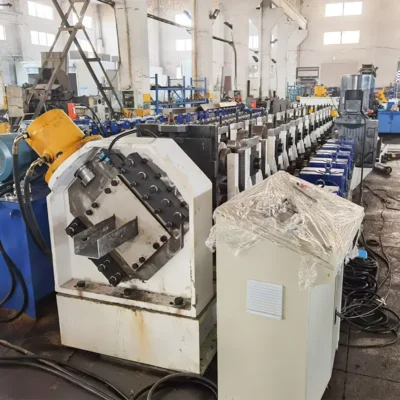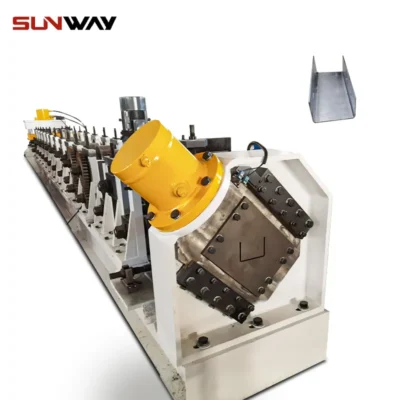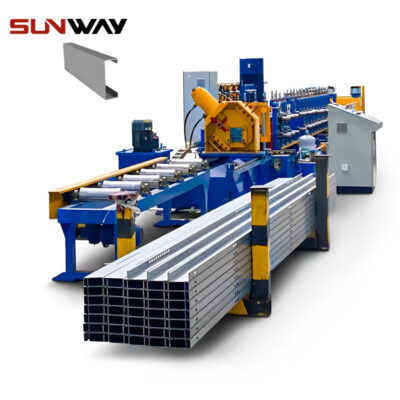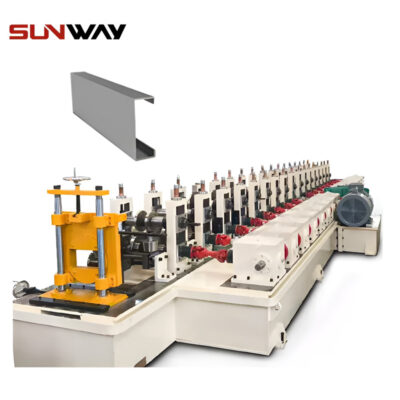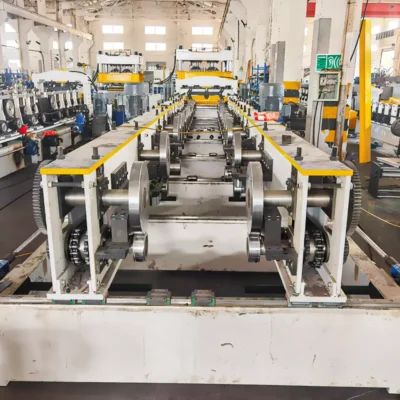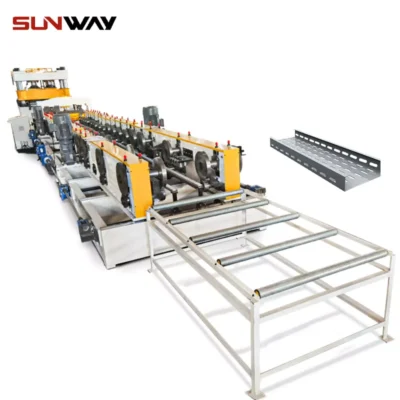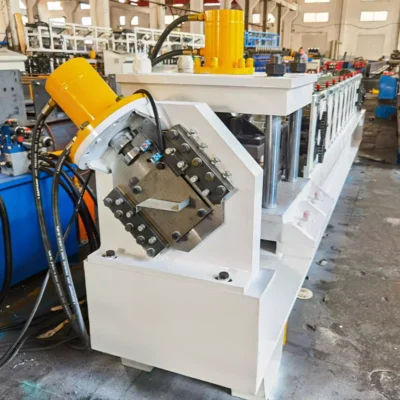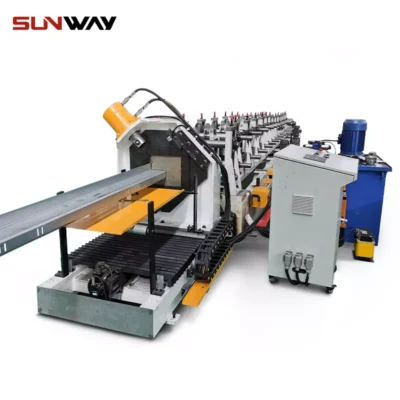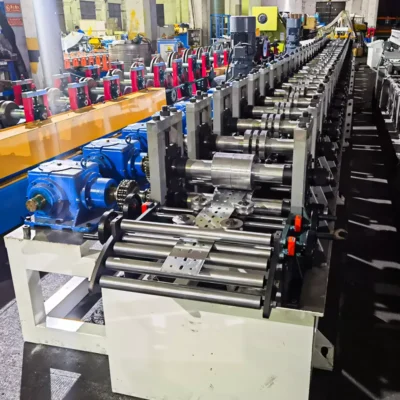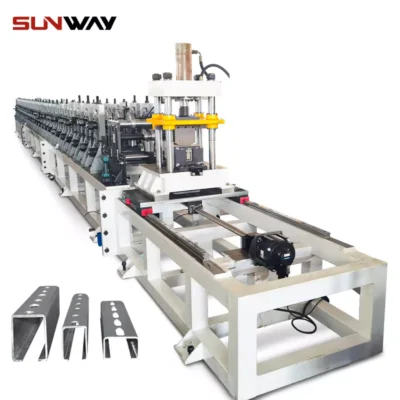In the construction industry, efficiency, durability, and precision are non-negotiable. From structural beams to roofing systems, metal profiles are at the heart of modern construction projects. Construction Tool Roll Forming Machines are revolutionizing how these metal components are manufactured by delivering high-quality profiles at scale and with unmatched efficiency. These machines are empowering construction companies to meet tight deadlines, reduce material waste, and streamline operations—all while maintaining strict compliance with industry standards.
In this guide, we’ll cover key applications, features, pricing, manufacturers, and why Wuxi Sunway Machinery has become a trusted name in providing cutting-edge roll-forming solutions for the construction industry. Whether you’re a contractor looking to optimize your supply chain or a manufacturer seeking innovative equipment, this article has everything you need to know about Construction Tool Roll Forming Machines.
What Are Construction Tool Roll Forming Machines?
A Construction Tool Roll Forming Machine is a specialized piece of equipment designed to convert flat metal sheets or coils into precise profiles used in construction. These machines are renowned for their ability to produce high-quality components at high speeds, making them indispensable for the construction industry.
Key Components Produced
- Roofing Profiles: Corrugated sheets, standing seam panels, and trapezoidal panels.
- Wall Cladding: Metal profiles for building exteriors and facades.
- Purlins: C and Z purlins used in steel structures for roofs and walls.
- Floor Decking: Composite floor systems that combine concrete and steel.
- Studs and Tracks: Profiles for lightweight partitioning systems.
- Gutters and Downspouts: Drainage systems for rainwater management.
- Custom Profiles: Tailored designs for unique architectural or structural needs.
By automating the roll-forming process, these machines significantly improve production speed, accuracy, and cost-effectiveness in the manufacturing of construction tools and materials.
Applications of Construction Tool Roll Forming Machines
The versatility of Construction Tool Roll Forming Machines makes them essential for a wide range of construction projects. Below are some key applications:
1. Roofing Systems
- Use Case: Manufacturing corrugated sheets, standing seam panels, and metal tiles.
- Why It’s Essential: Ensures weather-resistant, durable, and aesthetically pleasing roofing solutions.
2. Steel Structures
- Use Case: Producing C and Z purlins for steel-framed buildings.
- Why It Matters: Provides structural support for roofs and walls, ensuring stability and strength.
3. Wall Cladding
- Use Case: Crafting metal profiles for building facades and exteriors.
- Why It’s Valuable: Enhances the building’s appearance while improving insulation and durability.
4. Flooring Systems
- Use Case: Creating metal decking profiles for composite floor systems.
- Why It’s Relevant: Combines steel and concrete for high-strength, lightweight floors.
5. Drainage Systems
- Use Case: Manufacturing gutters, downspouts, and other rainwater management components.
- Why It’s Critical: Ensures efficient water drainage, preventing structural damage.
6. Interior Partitioning
- Use Case: Producing studs and tracks for drywall systems.
- Why It’s Beneficial: Simplifies the installation of lightweight, modular partitions.
Key Features of Wuxi Sunway Construction Tool Roll Forming Machines
Wuxi Sunway Machinery is a global leader in roll-forming technology, offering machines tailored to the unique demands of the construction industry. Here are the standout features that make their machines a top choice for construction tool manufacturing:
1. High-Speed Production
- Performance: Capable of producing up to 20–100 meters of profiles per minute, depending on material and complexity.
- Why It’s Critical: Meets the high-volume demands of large-scale construction projects.
2. Advanced Material Compatibility
- Supported Materials:
- Galvanized Steel
- Aluminum
- Stainless Steel
- Color-Coated Sheets
- Why It’s Valuable: Ensures manufacturers can produce durable, corrosion-resistant components.
3. Precision Engineering
- Performance: Dimensional tolerances as low as ±0.05mm, ensuring consistent quality.
- Why It’s Essential: Reduces material waste and ensures compatibility with other construction components.
4. Customizable Tooling
- What It Provides: Modular tooling systems for creating unique profiles tailored to specific construction needs.
- Why It’s Game-Changing: Supports architectural innovation and custom project requirements.
5. IoT and Automation Integration
- What It Enables: Real-time monitoring, automated adjustments, and predictive maintenance using IoT systems.
- Why It’s Revolutionary:
- Enhances production efficiency.
- Reduces downtime and maintenance costs.
- Provides actionable insights for continuous improvement.
6. Integrated Cutting and Punching
- What It Includes: Systems for precision cutting, hole punching, and perforation during the roll-forming process.
- Why It’s Beneficial: Simplifies assembly and reduces post-production processes.
7. Eco-Friendly Operations
- The Feature: Energy-efficient motors and optimized workflows to reduce power consumption.
- Why It’s Significant: Aligns with the construction industry’s growing focus on sustainability.

Production Workflow of a Construction Tool Roll Forming Machine
The manufacturing process for construction tools is designed for efficiency, precision, and scalability. Below is an overview of the typical workflow:
1. Material Loading
- Coils of metal sheets are loaded onto a decoiler, ensuring a continuous supply for production.
2. Straightening and Leveling
- A leveling unit ensures the material is flat and free of defects before roll forming begins.
3. Roll Forming
- The material passes through a series of rollers that gradually shape it into the desired profile, maintaining strict tolerances.
4. Cutting and Punching
- Integrated systems add precision holes or slots and cut the profiles to custom lengths as required.
5. Surface Coating
- Optional systems apply protective or decorative coatings, such as color finishes or anti-corrosion treatments.
6. Quality Inspection
- Finished profiles are inspected for dimensional accuracy, strength, and compliance with construction standards.
7. Packaging and Delivery
- Completed components are bundled, labeled, and prepared for secure transportation to construction sites or storage facilities.
Pricing of Construction Tool Roll Forming Machines
The cost of a Construction Tool Roll Forming Machine depends on its capabilities, material compatibility, and customization options. Below is a general pricing guide for 2025:
| Machine Type | Capabilities | Price Range (USD) |
|---|---|---|
| Standard Machines | Basic construction profile production | 200,000–200,000–200,000–500,000 |
| Advanced Machines | High-speed, integrated cutting and punching systems | 500,000–500,000–500,000–1,500,000 |
| Fully Customizable Machines | IoT, modular tooling, and advanced material handling | 1,500,000–1,500,000–1,500,000–3,000,000 |
For detailed pricing and financing options, contact Wuxi Sunway Machinery.
FAQs About Construction Tool Roll Forming Machines
| Question | Answer |
|---|---|
| What materials can these machines process? | Galvanized steel, aluminum, stainless steel, and color-coated sheets. |
| What is the production speed of these machines? | Machines can produce up to 20–100 meters of profiles per minute, depending on material and complexity. |
| Can these machines handle custom designs? | Yes, modular tooling allows for the creation of bespoke profiles. |
| Are these machines eco-friendly? | Yes, they feature energy-efficient motors and optimized workflows to reduce power consumption. |
| What industries benefit from these machines? | Construction, infrastructure, and architectural sectors. |
| Do these machines comply with safety standards? | Yes, they meet ISO, CE, and other international safety standards. |
| What is the lifespan of these machines? | With proper maintenance, these machines can last 20–30 years or more. |
| What is the typical warranty period? | Machines usually come with a 1–2 year warranty, with extended options available. |
| Can these machines support sustainable production? | Yes, they are optimized to minimize waste and support recyclable materials. |
| What is the price range for these machines? | Prices range from 200,000to200,000 to 200,000to3,000,000, depending on features and customization options. |
Global Market Trends for Construction Tool Roll Forming Machines in 2025
The construction industry is undergoing a transformation, fueled by technological advancements and shifting priorities. Here are the key trends shaping the global market for Construction Tool Roll Forming Machines in 2025:
1. Increased Demand for Prefabricated and Modular Construction
- Trend: The rise of prefabricated and modular construction solutions has driven the need for precision-engineered metal profiles.
- Impact on Machines:
- Manufacturers require roll-forming machines capable of producing custom profiles for modular systems.
- Machines with high-speed production capabilities are essential for just-in-time delivery.
2. Focus on Sustainability
- Trend: Governments and businesses are prioritizing eco-friendly construction materials and processes to reduce environmental impact.
- Impact on Machines:
- Machines must handle recyclable materials like aluminum and galvanized steel efficiently.
- Energy-efficient motors and reduced material waste are becoming essential features.
3. Urbanization and Infrastructure Development
- Trend: Rapid urbanization in developing regions is fueling demand for construction materials.
- Impact on Machines:
- High-capacity roll-forming machines are needed to meet the volume demands of large-scale infrastructure projects.
- Machines must produce durable profiles capable of withstanding harsh environmental conditions.
4. Smart Manufacturing and IoT Integration
- Trend: The integration of IoT and AI in manufacturing is enabling smarter, more efficient production lines.
- Impact on Machines:
- IoT-enabled roll-forming machines provide real-time monitoring and predictive maintenance.
- AI-powered systems optimize production workflows, reducing downtime and increasing output.
5. Growth in Renewable Energy Projects
- Trend: The expansion of solar and wind energy projects has increased demand for metal profiles used in mounting systems and turbine components.
- Impact on Machines:
- Machines must be versatile enough to produce profiles for renewable energy applications.
- Precision and durability are critical to ensuring the longevity of these systems.
The Benefits of Automation in Construction Tool Manufacturing
Automation is revolutionizing the construction manufacturing industry by improving efficiency, reducing costs, and enhancing safety. Here’s how automation is transforming the production of construction tools:
1. Improved Production Speeds
- How Automation Helps:
- Automated roll-forming machines can produce profiles at speeds of up to 100 meters per minute.
- Reduces lead times, allowing manufacturers to meet tight project deadlines.
- Example: A roofing manufacturer using an automated roll-forming machine increased production capacity by 30% within six months.
2. Enhanced Precision
- How Automation Helps:
- Advanced sensors and control systems ensure consistent dimensional accuracy, reducing material waste.
- Supports complex designs with tight tolerances, enabling architectural innovation.
- Example: A wall cladding company used IoT-enabled machines to achieve dimensional tolerances as low as ±0.05mm, resulting in zero rework.
3. Lower Labor Costs
- How Automation Helps:
- Reduces the need for manual intervention, freeing up labor resources for other tasks.
- Minimizes errors caused by human fatigue or oversight.
- Example: A construction material supplier reduced labor costs by 25% after transitioning to automated roll-forming machines.
4. Enhanced Safety
- How Automation Helps:
- Features like light curtains, emergency stop systems, and interlocks keep operators safe.
- Reduces direct human involvement in high-risk tasks like material feeding or tooling changes.
- Example: A floor decking manufacturer reported zero workplace incidents within a year of adopting automated roll-forming systems.
5. Real-Time Monitoring and Maintenance
- How Automation Helps:
- IoT systems provide real-time data on machine performance, enabling predictive maintenance.
- Prevents unexpected breakdowns, ensuring uninterrupted production.
- Example: A purlin manufacturer reduced downtime by 40% through AI-powered predictive maintenance systems.
Advanced Technology Innovations in Construction Tool Roll Forming Machines
The roll-forming industry is embracing cutting-edge technologies to meet the evolving needs of construction manufacturers. Here are some of the most significant innovations:
1. AI-Powered Process Optimization
- What It Does: Uses artificial intelligence to analyze production data and optimize workflows.
- Advantages:
- Improves efficiency by identifying bottlenecks.
- Enhances quality by detecting and correcting deviations in real-time.
2. Modular Roll-Forming Systems
- What They Offer: Machines with interchangeable tooling for producing multiple profiles on a single production line.
- Advantages:
- Reduces downtime associated with tooling changes.
- Supports diverse production needs without additional equipment.
3. Eco-Friendly Coating Integration
- What It Includes: Systems for applying eco-friendly coatings like color finishes or anti-corrosion treatments.
- Advantages:
- Reduces the environmental impact of post-production processes.
- Extends the lifespan of construction components.
4. Digital Twin Technology
- What It Enables: Virtual simulations of the roll-forming process to optimize machine settings before production.
- Advantages:
- Reduces trial-and-error during setup.
- Ensures consistent quality across production runs.
5. High-Strength Material Processing
- What It Handles: Advanced materials like ultra-high-strength steel and composite alloys.
- Advantages:
- Expands the range of applications for roll-formed profiles.
- Meets the demands of high-performance construction projects.
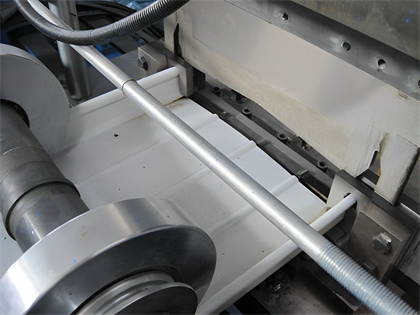
Real-World Success Stories: Construction Tool Roll Forming Machines
Let’s explore how Construction Tool Roll Forming Machines have transformed businesses across the globe:
1. Case Study: Roofing Manufacturer
- Client: A leading supplier of metal roofing systems for commercial buildings.
- Challenge: Required a machine capable of producing multiple roofing profiles on a single line.
- Solution: Wuxi Sunway Machinery delivered a modular roll-forming system with interchangeable tooling.
- Results:
- Reduced downtime by 50% during profile changes.
- Increased production capacity by 40%, meeting growing market demand.
- Enhanced product quality with consistent dimensional accuracy.
2. Case Study: Steel Structure Supplier
- Client: A company specializing in steel-framed buildings for industrial applications.
- Challenge: Needed high-strength C and Z purlins that met international construction standards.
- Solution: Wuxi Sunway provided a roll-forming machine with precision engineering and integrated cutting systems.
- Results:
- Produced purlins with tolerances of ±0.05mm, exceeding client expectations.
- Reduced material waste by 15%, lowering production costs.
- Expanded the client’s market reach with globally compliant products.
FAQs About Construction Tool Roll Forming Machines
| Question | Answer |
|---|---|
| What materials can these machines process? | Galvanized steel, aluminum, stainless steel, and composite alloys. |
| Can these machines handle high-strength materials? | Yes, advanced machines are designed for ultra-high-strength steel and other durable materials. |
| What is the production speed? | Up to 100 meters per minute, depending on material and profile complexity. |
| Are these machines environmentally friendly? | Yes, they feature energy-efficient motors and support recyclable materials. |
| Do these machines comply with global standards? | Yes, they meet ISO, CE, and other international safety and quality standards. |
| Can they produce custom profiles? | Absolutely! Modular tooling supports bespoke designs for unique construction needs. |
| What industries benefit the most from these machines? | Construction, infrastructure, renewable energy, and architectural sectors. |
| What is the warranty period? | Machines usually come with a 1–2 year warranty, with extended options available. |
| What is the price range? | Prices range from 200,000to200,000 to 200,000to3,000,000, depending on features and customizations. |
Why Choose Wuxi Sunway Machinery for Construction Tool Roll Forming Machines?
Wuxi Sunway Machinery is a trusted partner for manufacturers worldwide, offering unparalleled solutions for the construction industry. Here’s why:
- Proven Expertise: Decades of experience in delivering high-performance roll-forming machines.
- Global Compliance: Machines designed to meet international safety, quality, and environmental standards.
- Innovation-Driven: Features like IoT integration, modular tooling, and AI-powered systems set their machines apart.
- Comprehensive Support: From consultation to installation and after-sales service, Sunway ensures your success.
- Sustainability Commitment: Machines designed to reduce waste and support eco-friendly manufacturing practices.
Conclusion: Building a Better Future with Roll Forming Machines
In an industry where precision and efficiency are paramount, Construction Tool Roll Forming Machines are revolutionizing how metal profiles are manufactured. With advanced features, automation, and customization options, these machines are empowering manufacturers to meet the demands of modern construction projects.
Ready to transform your manufacturing process? Partner with Wuxi Sunway Machinery today and explore their cutting-edge solutions for the construction industry. Together, let’s build the future—one profile at a time.

